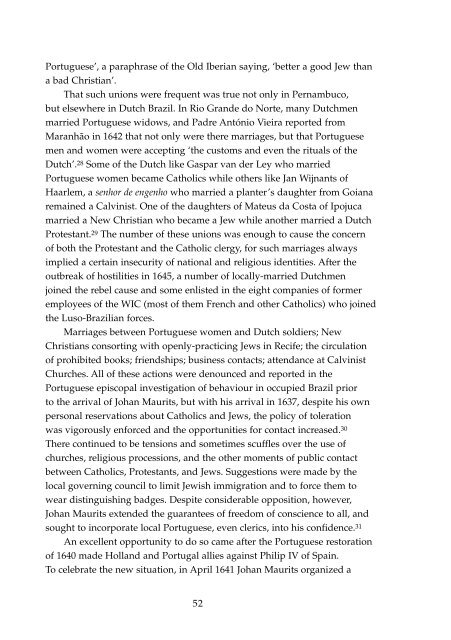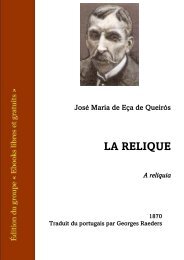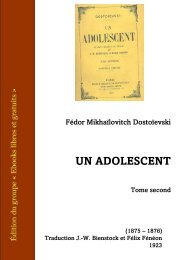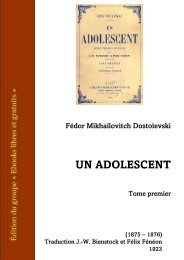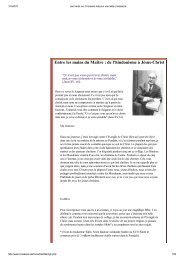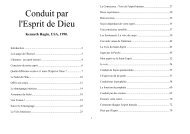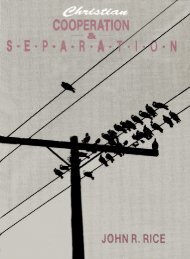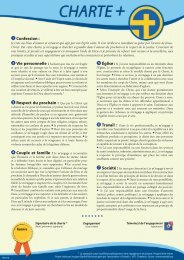The Expansion of tolerance
Create successful ePaper yourself
Turn your PDF publications into a flip-book with our unique Google optimized e-Paper software.
Portuguese’, a paraphrase <strong>of</strong> the Old Iberian saying, ‘better a good Jew than<br />
a bad Christian’.<br />
That such unions were frequent was true not only in Pernambuco,<br />
but elsewhere in Dutch Brazil. In Rio Grande do Norte, many Dutchmen<br />
married Portuguese widows, and Padre António Vieira reported from<br />
Maranhão in 1642 that not only were there marriages, but that Portuguese<br />
men and women were accepting ‘the customs and even the rituals <strong>of</strong> the<br />
Dutch’. 28 Some <strong>of</strong> the Dutch like Gaspar van der Ley who married<br />
Portuguese women became Catholics while others like Jan Wijnants <strong>of</strong><br />
Haarlem, a senhor de engenho who married a planter’s daughter from Goiana<br />
remained a Calvinist. One <strong>of</strong> the daughters <strong>of</strong> Mateus da Costa <strong>of</strong> Ipojuca<br />
married a New Christian who became a Jew while another married a Dutch<br />
Protestant. 29 <strong>The</strong> number <strong>of</strong> these unions was enough to cause the concern<br />
<strong>of</strong> both the Protestant and the Catholic clergy, for such marriages always<br />
implied a certain insecurity <strong>of</strong> national and religious identities. After the<br />
outbreak <strong>of</strong> hostilities in 1645, a number <strong>of</strong> locally-married Dutchmen<br />
joined the rebel cause and some enlisted in the eight companies <strong>of</strong> former<br />
employees <strong>of</strong> the WIC (most <strong>of</strong> them French and other Catholics) who joined<br />
the Luso-Brazilian forces.<br />
Marriages between Portuguese women and Dutch soldiers; New<br />
Christians consorting with openly-practicing Jews in Recife; the circulation<br />
<strong>of</strong> prohibited books; friendships; business contacts; attendance at Calvinist<br />
Churches. All <strong>of</strong> these actions were denounced and reported in the<br />
Portuguese episcopal investigation <strong>of</strong> behaviour in occupied Brazil prior<br />
to the arrival <strong>of</strong> Johan Maurits, but with his arrival in 1637, despite his own<br />
personal reservations about Catholics and Jews, the policy <strong>of</strong> toleration<br />
was vigorously enforced and the opportunities for contact increased. 30<br />
<strong>The</strong>re continued to be tensions and sometimes scuffles over the use <strong>of</strong><br />
churches, religious processions, and the other moments <strong>of</strong> public contact<br />
between Catholics, Protestants, and Jews. Suggestions were made by the<br />
local governing council to limit Jewish immigration and to force them to<br />
wear distinguishing badges. Despite considerable opposition, however,<br />
Johan Maurits extended the guarantees <strong>of</strong> freedom <strong>of</strong> conscience to all, and<br />
sought to incorporate local Portuguese, even clerics, into his confidence. 31<br />
An excellent opportunity to do so came after the Portuguese restoration<br />
<strong>of</strong> 1640 made Holland and Portugal allies against Philip IV <strong>of</strong> Spain.<br />
To celebrate the new situation, in April 1641 Johan Maurits organized a<br />
52


